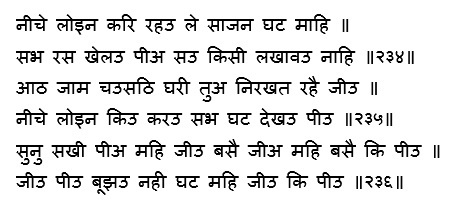Feb 14, 2026
Feb 14, 2026

Neeche lo-in kar rahau le saajan ghaT maeh.
Sabh ras khelau peea sau kisee lakhaavau naeh. 234.
AaTh jaam chausaTh gharee tu-a nirakhat rahai jeeau.
Neeche lo-in kiau karau sabh ghaT dhekhau peeau. 235.
Sunn sakhee peea meh jeeau basai jeea meh basai k peeau.
Jeeau peeau boojhau nahee ghaT meh jeeau k peeau ||236||
– (SGGS, Pg. No. 1377)
Translation:
Kabir, I keep my eyes lowered, and enshrine my (Beloved) Friend within my heart.
I enjoy all pleasures with my Beloved, but I do not let anyone else know. ||234||
Twenty-four hours a day, every hour, my soul continues to look to You, O Lord.
Why should I keep my eyes lowered? I see my Beloved in every heart. ||235||
Listen, O my companions: my soul dwells in my Beloved, and my Beloved dwells in my soul.
I realize that there is no difference between my soul and my Beloved; I cannot tell whether my soul or my Beloved dwells in my heart. ||236||
Explanation
There are three consecutive Saloks/Dohas here. Kabir Ji is using a metaphor of young newlywed bride to explain his state of mind, and its three-step progression. First, he says that his eyes are downcast looking within and cherishing his Beloved Lord-Husband. He says he is enjoying all the pleasures with my beloved, but shyly will not share the details with anyone. His shy eyes are downcast as he does not wish to lift his gaze from his beloved and cast it on another person or object. When someone inquired about his state, his response was that I have a guest in my house (within), so I have become too busy, with no time to venture out. But then after a period he went out and was confronted by those same people enquiring if his guest left, as now he was venturing out. His response is in next para.
He says, the Beloved guest is still there, but now he is seeing his Beloved all the time, 24 x 7 (8 jaam /pehar and 64 gharree). He says that he does not need to keep his eyes downcast anymore, as he can now see that Beloved, in each and everyone. So, he feels not obliged to stay home, and feeling free to roam, yet not missing the sight of Beloved.
In the third para he shares the new perspective with his mates that has dawned in him. He says within (the body house) dwells the soul, but my Beloved dwells in the soul. He even finds dichotomy that soul dwells in my Beloved. He finds a new predicament as to who is residing within, soul or the Beloved? It is his own beautiful way of putting in words that the Beloved is in the soul, or his soul is in the Beloved, the reality is soul and Beloved have become one and inseparable. This is the ultimate human experience, the experience of Oneness.
Here in these three Saloks/Dohas Kabir has shared the ultimate achievement in human life, while alive, not after death. To experience that he cleaned his house (mind). When it got cleaned free of duality, he found that Lord within – an experience of merger. But that experience broadened, and he could see Lord in all. This broadened even further, that he could see that nothing else exists besides Lord.
Kabir Ji has shared elsewhere about this experience of oneness in these words:

Kabir mun nirmal bhiaa jaisaa ga(n)gaa neer.
Paachhai laago har firai kahat Kabir Kabir. 55.
– (SGGS, Pg. No. 1367)
Translation:
Kabir, my mind has become immaculate, like the waters of the Ganges.
The Lord follows after me, calling, ""Kabir! Kabir!""||55||
What an experience Kabir is sharing that instead of him chasing Lord, he is being chased by Lord. Further a new development of merger has taken place:
![]()
Abb hum tum ek bhae heh Ekai dhekhat mun pateeaahee. 1.
– (SGGS, Pg. No. 339)
Translation:
Now, You (O Lord!) and I have become one; seeing this, my mind is content
(that it is You alone, we are not separate from you). ||1||
The merger of Kabir with Lord is so complete, that they have become inseparable:
![]()
Jiau jal jal meh pais na nikasai tiau ddur milio julaaho. 1.
– (SGGS, Pg. No. 692)
Translation:
(Just) Like water, dripping into water, cannot be separated out again, so is the weaver Kabir, with a heart free from duality, merged into the Lord. ||1||
In that merger he sees himself sitting on the Lord’s throne :

Abb tau jai chadde si(n)ghaasan milae hai saari(n)gapaanee.
Ram Kabira aik bhae hai koi na sakai pachhaanee. 6.3
– (SGGS, Pg. No. 969)
Translation:
Now, I have mounted to the throne of the Lord; I have met the Lord, the Sustainer of the World.
The Lord and Kabir have become one. No one can tell them apart. ||6||3||
Kabir Ji goes in ecstasy, and asks his mates to sing the celebratory marriage songs to commemorate their union:

Gaau gaau ree dhulahanee mangalachaaraa.
Merae graeh aae raajaa raam bhataaraa. 1. Rahaau.
– (SGGS, Pg. No. 482)
Translation: Sing, sing, O brides of the Lord, the marriage songs of the Lord.
The Lord, my King, has come to my house as my Husband. ||1||Pause||
Kabir has shared about the pinnacle of human experience - the merger with Lord. Even upon achieving this highest pedestal Kabir does not forget his humble roots of being a weaver from a low caste. Those humble roots made him butt of jokes and ridicule in the society, yet after experience of merger, occupying the Lord’s throne he still embraces his humble roots.
References:
1. www.Sikhitothemax.com
2. www.Srigranth.org
3. Singh, Sahib, Sri Guru Granth Sahib Darpan, Volumes 2, 3, 5, 7, 9.
July 30, 2022